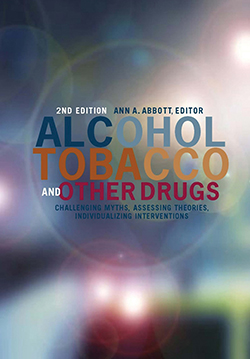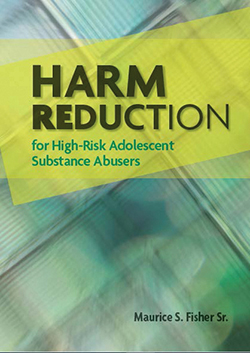
It’s extremely important for social workers and other human service workers to know about the effects of substance abuse regarding the clients they work with, says Ann A. Abbott, PhD, LCSW, a retired social work educator and former associate dean and faculty member at Rutgers University School of Social Work.
The misuse of alcohol, tobacco and other drugs has severe emotional and financial consequences for users, their families, and society. The collective effects are often devastating, because the magnitude of the problems associated with alcohol, tobacco and drug dependency (ATOD) is far-reaching, says Abbott, who now works part-time with doctoral social work students at Yeshiva University in New York City.
Abbott edited the NASW Press book, Alcohol, Tobacco, and Other Drugs: Challenging Myths, Assessing Theories, Individualizing Interventions, 2nd Edition. The text can help prepare new social workers as well as update seasoned professionals about the new realities and challenges in this specialization.
“It’s important to be aware (of ATOD) no matter what clients you are working with,” Abbott said. “It’s important to have a handle on how the spectrum of drugs can impact behavior and situations surrounding people’s lives.”
Most, if not all, social workers will encounter some forms of evidence of the effects of ATOD; whether illegal, prescribed, or over the counter, the book’s prologue explains. The evidence will take many forms, ranging from drug dependence to alcohol abuse, and can include problematic use, intentional or unintentional misuse, secondary impact on innocent family members, neighborhood fear, crime, child abuse or neglect, and domestic violence.
A major myth about substance abuse is that if a doctor has prescribed something for you, it must be safe to use or abuse, such as an opioid prescription, Abbott points out.
“Then (the person) becomes addicted and that’s the end of the story,” she says.
The book begins by discussing myths surrounding ATOD then goes into specific types of substances. There is much emphasis on assessment, intervention, and support groups, as well as co-occurring disorders, says Abbotts, who is a former NASW president.
Readers will gain an understanding of the influence tobacco, alcohol and other drugs have on people’s lives. It will also help the social worker identify signs of substance abuse.
“It presents a good cross-cutting approach to what this all entails and how it impacts the practice of social work,” Abbott says. “It’s incumbent that each social worker has a basic understanding (of substance use and abuse).”
Author Explores Harm Reduction Techniques for Youth

The ongoing pandemic combined with increased fears of aggression have heightened awareness of the needs of young people seeking mental health treatment, according to news reports.
The NASW Press book Harm Reduction for High-Risk Adolescent Substance Abusers takes a deeper look into this topic. In the text, the late Maurice S. Fisher Sr., PhD, LCSW, shares his experience of helping adolescent clients take charge of their life after negative consequences of substance use or abuse, and empowering young men and women to make better choices and minimize risky behaviors using harm reductive methods.
Fisher, who died in 2021, was an addiction/substance abuse counselor. His book points out that violence has many causes, including frustration, exposure to violent media, violence experienced in the home or neighborhood, substance use, and a tendency to see other people’s actions as hostile even when they are not. Certain situations, such as insults and other provocations, and environmental factors like heat and overcrowding, increase the risk of aggression.
“Harm Reduction for High-Risk Adolescent Substance Abusers” provides the research, discussion, and specific clinical techniques that can be used in private practices. Cognitive-behavioral therapy and skill development, psychoeducational and interpersonal skills, anger management, and support group therapies are discussed, as are ethical issues that may come up in practice.
The book serves as a good resource for therapists, counselors and clinicians to help adolescents who have lost control and are signaling for help to get their life back on track so they can grow into adulthood as successful members of society.
NASW Press products are available in print and ebook format at naswpress.org.